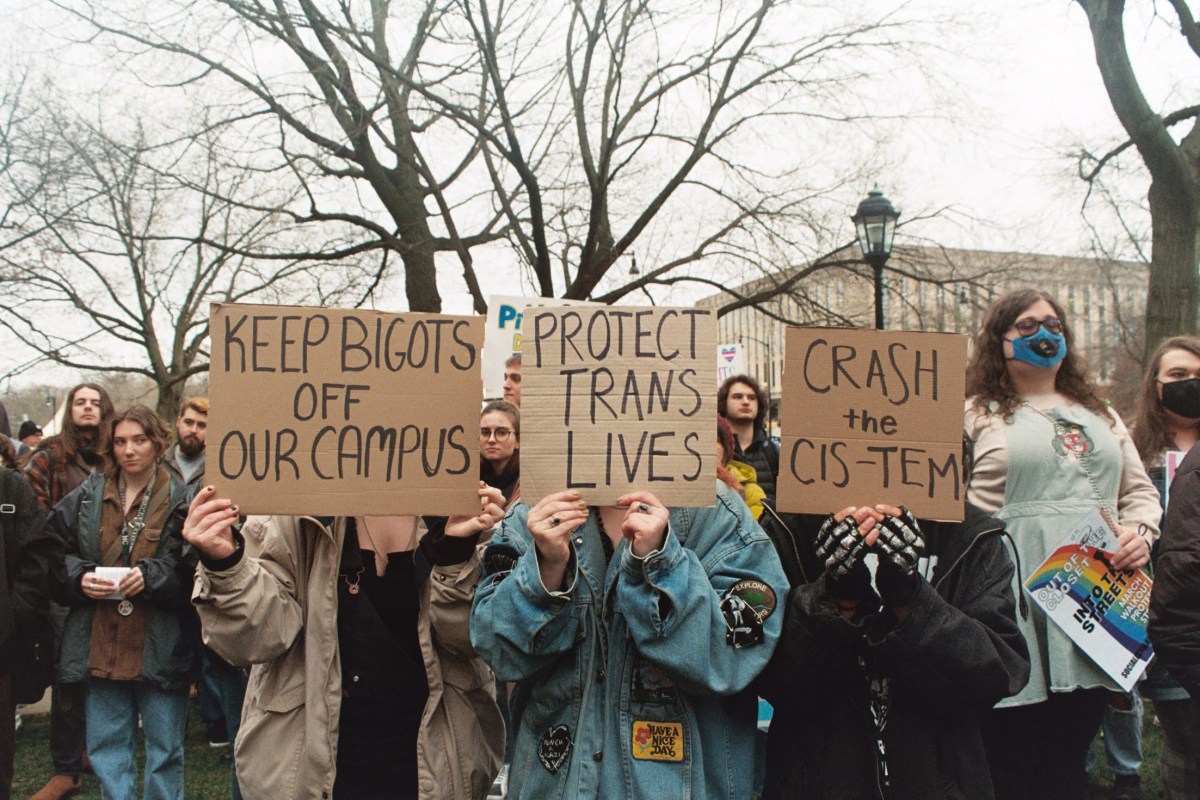The University of Pittsburgh has pressed summary charges against at least three pro-LGBTQ protesters and held conduct hearings for eight students who disrupted a public Board of Trustees meeting in September.
Most of the protesters, some unaffiliated with the university, were members and supporters of the on-campus group Trans Action Building. The group formally emerged in May, following a tumultuous semester that saw “anti-trans” speaker events on campus spark outrage and concern among LGBTQ students.
About 12 students, staff and unaffiliated supporters participated in Trans Action Building’s protest on Sept. 29, said Iris Olson, a Pitt staff member and organizer with the group. They separated into three groups and protested in succession, with one person in each designated to speak, and campus police escorted them out, Olson said. A video posted to Instagram shows some protesters walking out of the meeting with police, shouting their demands as they leave.
At least three supporters of Trans Action Building who are unaffiliated with Pitt were charged with “Disorderly Conduct Engage In Fighting,” court records show. Pitt initiated internal hearings against several students for allegedly violating university policy. Olson was asked to meet with a member of the Office of Human Resources to receive a verbal warning about the procedure for speaking at the meetings.
Pitt’s Office of Student Conduct threw out the cases against several students due to a “lack of evidence,” according to the University Times, a publication serving faculty and staff. Olson also said they did not face repercussions as a staff member. But at least three supporters unaffiliated with the university face ongoing summary charges for the same incident that could result in fines of up to $300 and imprisonment of up to 90 days. Three have pleaded not guilty as of Monday, including 31-year-old Joshua Kovel.
“You take the queer people that were talking about queer rights and trans people talking about trans rights, and you give them court summons. It’s not good optics for the university,” Kovel said. “It’s a waste of time for us, because it is a ridiculous case, and we didn’t do anything. And what are they going to do? Throw us in jail for protesting for trans rights?”
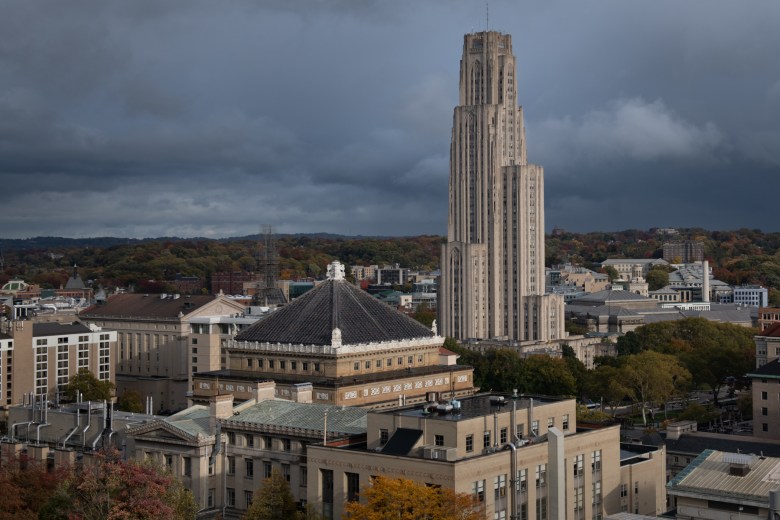
The chair of the Board of Trustees can direct campus police to escort out and, “as a last resort,” arrest people who disrupt meetings and refuse to leave, according to board rules. The September protesters “did not follow repeated requests to cease their disruption of the meeting,” Pitt spokesperson Jared Stonesifer said in a statement.
“When appropriate, the University uses internal conduct processes to address on-campus misconduct by its affiliates,” Stonesifer said. “However, the only recourse the University has to address misconduct on campus by non-affiliates is what is available via the Pennsylvania criminal code.”
Melissa Melewsky, media law counsel for the Pennsylvania NewsMedia Association, said Pitt can impose reasonable rules to control conduct during public meetings. She said it’s not unusual for institutions to remove members of the public who are out of line, but pressing charges against them is “extremely rare.”
“To have that conduct result in a criminal charge is something that I haven’t seen very often at all, and I’ve been doing this for almost 20 years,” Melewsky said.
“Even if the charges are dismissed eventually, they’ve already set the precedent that ‘Hey, if you speak out of turn, you might be arrested and charged with a crime.’ That’s a significant deterrent to public speech.”
Zach Greenberg, senior program officer on the campus rights team at the Foundation for Individual Rights and Expression [FIRE], said that Pitt acted within bounds, including in pursuing charges. “Talking over people, interrupting meetings, shutting down speech of others, that’s not free speech. And that’s something that can be punished by universities,” he said.
Students can protest, Greenberg said, by using signs or scheduling time to speak during the meeting.
Members of the public can request to speak at Pitt’s Board of Trustees meetings by writing the Office of the Secretary 15 days in advance, but the chair can deny those requests at will. An email from one Trans Action Building member shows that they requested to speak by emailing the office 20 days in advance. They followed up on Sept. 22.
The response from the office, dated Sept. 22, reads: “I am sorry we missed your email sent on Saturday, Sept. 9. Unfortunately, the agenda is posted. To give this the time it deserves, will you consider the next public meeting?”
“My colleagues today sent multiple requests to speak at the Board of Trustees meeting and were … told to try again for December, even though we followed your processes and we followed your deadlines,” Olson said during the meeting. “Today, queer and trans voices are being silenced.”
Chancellor Joan Gabel told the University Times after the meeting that “I absolutely respect their right to protest and we’re in a public meeting and they have the opportunity to protest, and then we restored the process of the board meeting in due course so that the business can continue.”
Students with the Fossil Free Pitt Coalition, a campus organization advocating for the university to divest from the fossil fuel industry, spoke out in a similar fashion during the September meeting. Pitt held conduct hearings for four students, the group says. Meredith Felde, a student involved with Fossil Free Pitt, said her hearing officer indicated that similar protests in the future may be punished.
Stonesifer said the university does not comment on the outcomes of conduct cases, citing federal privacy law, but Olson said that students from both groups haven’t faced repercussions. If Pitt had found the students responsible for the alleged violations, they could temporarily lose their ability to live in Pitt-owned housing and their status at the university could be “conditioned upon future behavior,” according to the Student Code of Conduct.
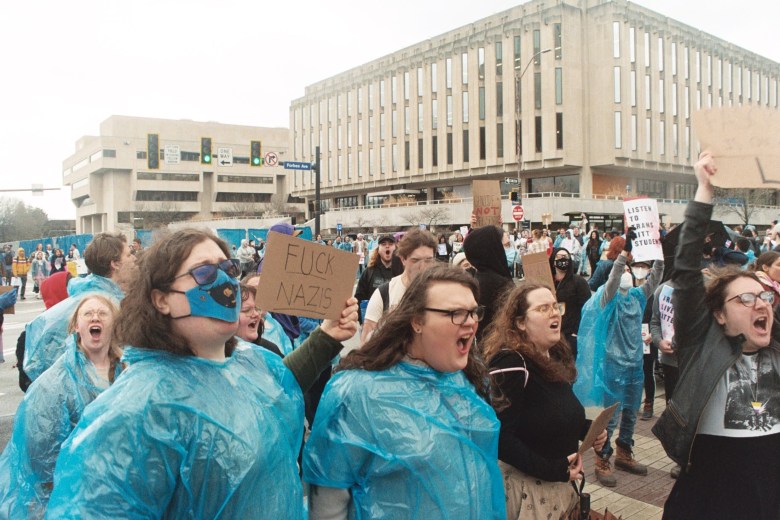
Pitt isn’t the only university that has taken a more aggressive stance on student protests, though the severity of the response varies. This summer, two graduate students and an alumnus of the University of California, San Diego, were accused of felony vandalism of a campus building. The union representing the protesters said they used chalk and washable window markers. The university recently said it will not move forward with criminal charges.
Stonesifer said Pitt does not plan to drop the summary charges.
The university’s response
Trans Action Building is demanding that the university create three on-campus resource centers for LGBTQ students, as well as students of color and those with disabilities. The group also wants the university to provide expanded trans-inclusive housing, among other demands.
In June, a smaller group of protesters with Trans Action Building disrupted that month’s Board of Trustees meeting to advocate for these demands. Campus police escorted them out without further repercussions, Olson said.
The protesters disrupted a portion of the September board meeting during which the trustees were voting on whether to elect Louis Cestello as chair of the board. A livestream of the meeting shows Cestello interrupting trustee David Chavern, who was participating in the meeting via Zoom, over an apparent, but unseen, disruption.
“Hold on,” Cestello said, reading from a piece of paper. “There’s established procedures for bringing issues and concerns to the board. You have not been following these.” He said it was announced at the start of the meeting that participation was limited to trustees and invited guests, and that further disruptions would “be dealt with as appropriate.”
“Officers, can you please remove this and let us go on with our board deliberations, ” Cestello said.
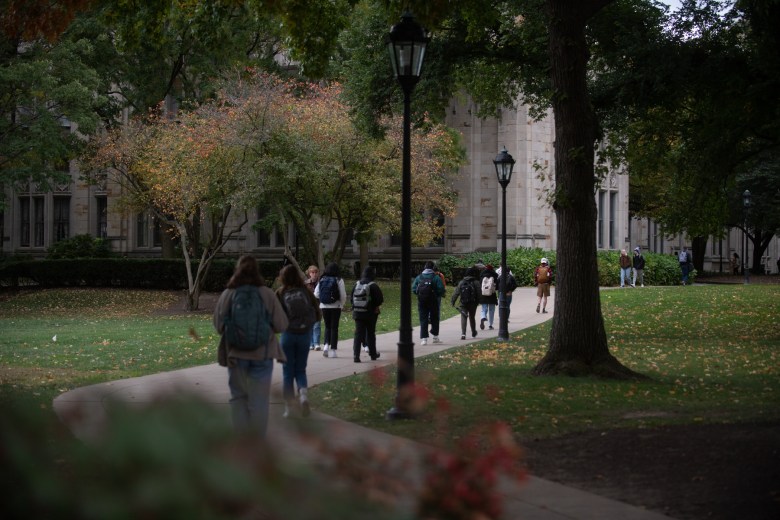
Once outside, Olson said the campus police asked the protesters for identifying information — something that did not happen in June. The officers told the group that “they just wanted to verify who we were, so that we wouldn’t come back to this public meeting again, and that we were not allowed to return,” Olson said.
Iwan Martin, 32, was one of the unaffiliated supporters charged with disorderly conduct. He lives in the U.S. as a permanent resident, and he’s concerned that he could be deported if he’s convicted of a crime. His residency status has historically made him hesitant to participate in activism, but he said he was told that September’s protest wasn’t expected to get out of hand.
“From the beginning, I was intending to just be very polite, to be very unobtrusive, comply with anything that anybody told me to do,” Martin said.
Martin and Kovel said their role in the protest was to wear shirts with the group’s demands written on them. Kovel said he did not speak out during the meeting, and Martin recounted that he was silent throughout. Yet, both were charged with “Disorderly Conduct Engage In Fighting,” and their citations read that they “engaged in unreasonable noise during a public meeting” after being asked to stop.
Kovel initially was unsure what the charge was for.
“I was like, ‘When did I engage in fighting with anybody?,’” he said. He doesn’t have a lawyer at this time, but he said he feels “fairly certain” that his case will be dismissed.
Martin described the charge against him as “blatantly untrue” but said he’s worried about the case’s potential implications for his residency status. He said he’s determining whether he can borrow money from people he knows to hire a lawyer.
“The feeling that I get is that the university is just annoyed by the protest and wants it to go away,” Martin said. “They talk a big talk about caring a lot about people and wanting to listen to their concerns and make sure that everybody’s heard, but I think in terms of their actions, they are completely disinterested in actually doing so.”
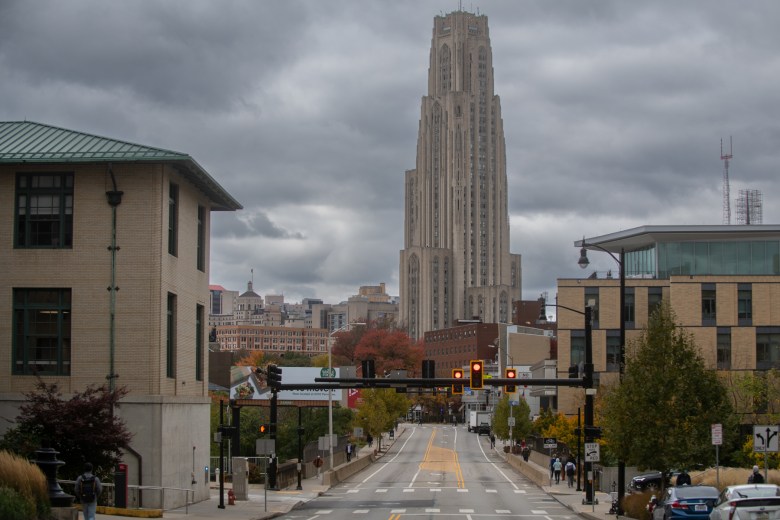
A letter received by one student, redacted and posted on social media, calls them to attend an internal hearing because they had allegedly violated the university’s demonstration guidelines.
Pitt’s guidelines prohibit the disruption of “activity related to the University’s educational process, including, but not limited to, activity occurring in classrooms, offices, laboratories or other University facilities.”
Olson said that Trans Action Building had reviewed the policy, along with available information about public participation during the board’s meetings, and assumed that their protest would adhere to them.
The board has published rules regarding public participation, which state: “Except by invitation of the Board, no one who is not a member of the Board shall address the Board, participate in the proceedings, interfere with the movement of participants or observers, or disturb the meeting in any way.”
Greenberg, with FIRE, said that Pitt could do a better job of informing students of the difference between disruptive protest and protected speech.
How are the protesters moving forward?
Both groups, Trans Action Building and Fossil Free Pitt, took to Instagram to state that they “will not be silenced” by Pitt’s response to their protests. Trans Action Building is hosting a public meeting on Saturday where attendees can collect “posters for upcoming events, offer ideas about how we could be preparing for them, and build community,” according to an Instagram post.
Felde said she believes that “there is legitimacy to breaking rules, if that’s part of your demonstration tactic.” However, she said that Fossil Free Pitt, which formed in 2014, has continually sought to adhere to the university’s demonstration guidelines for the protests it has hosted over the years.
Stonesifer, the spokesperson, said that the university’s Office for Equity, Diversity and Inclusion has been working since September to schedule a meeting with the leaders of Trans Action Building. He added that, in regards to Fossil Free Pitt, “The University is committed to transparency regarding its approach to fossil fuels. Pitt is handling the issue in accordance with recommendations from its Board of Trustees.”
Martin said he cares a lot about Trans Action Building and will try to support the group from the sidelines, but he probably will not attend future board meetings because of the personal risk. Kovel said that he’d like to help Trans Action Building in the future, if he has the time.
Pitt should’ve responded to the protest, Kovel said, by accommodating their requests to speak at that time.
“Trans rights are incredibly important, and the actual proper treatment of trans people needs to be a concern,” he said.
Emma Folts covers higher education at PublicSource, in partnership with Open Campus. She can be reached at emma@publicsource.org.
This story was fact-checked by Rich Lord.

